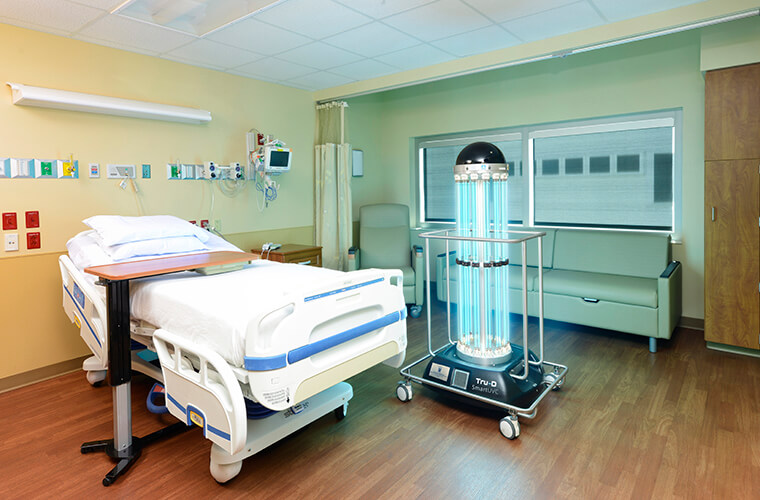BayCare Environmental Services Uses Robot to Attack COVID-19

Remember the Jetsons' household robot, Rosie? Well, meet “Trudy,” or Tru-D. She’s a 5-foot-5 germ-killing ultraviolet robot ready to neutralize any pathogen in her way. She is one deterrent BayCare’s Environmental Services teams use to attack COVID-19.
Technically, Tru-D SmartUVC − short for Total Room Ultraviolet Disinfection − is a mobile, automated UV disinfection system that BayCare hospital’s use to completely clean patient areas. It works by generating UV light energy that modifies the DNA structure of an infectious cell so that it cannot reproduce, and a cell that cannot reproduce cannot colonize and thus harm patients.
The technology allows the hospitals to confidently clean patient environments, including ICUs, patient rooms, surgery suites and the emergency room – killing pathogens (such as influenza, norovirus, C-diff, Ebola and other bacteria – even COVID-19) that can compromise patient outcomes. Tru-D is an intuitive system designed to complement a hospital’s comprehensive cleaning and disinfection program.
“We have 31 Tru-D units across the BayCare system,” said Dan Bennett, director for BayCare’s East Region Environmental Services. “This technology has proven to be an important added line of defense to protect the integrity of our environment and ensure enhanced patient outcomes.”
After a hospital team member cleans the room using traditional methods, Tru-D is rolled into the room to “finish the job.” The machine is turned on from outside the room using a handheld remote. Tru-D instantly analyzes the unique contents, shape and size of the room, then floods the targeted space (including shadows) with the proper amount of germicidal energy from the UVC lamps that run up and down its shaft. Tru-D spends whatever time is necessary to confidently eliminate infectious germs from contaminated surfaces before shutting down and audibly notifying the operator that disinfection is complete. Once activated, Tru-D takes about 30 minutes to disinfect a patient room.
“We are very aggressive with our UV utilization,” said Belinda Amaral, manager for Environmental Services at Mease Countryside Hospital. “All operating rooms are done on a nightly basis and all isolation precaution rooms are disinfected at discharge. Since COVID-19, we use Tru-D in our Emergency Department triage rooms, patient rooms and fast track, as well as in Imaging’s computerized tomography (CT), X-ray and Ultrasound.”
Another weapon in BayCare’s bucket of environmental safety tools is education. BayCare makes it possible for Environmental Services team members to receive certification credentials through the Association for the Health Care Environment (AHE), a professional membership group of the American Hospital Association.
According to AHE, through proper care and maintenance of the health care environment, health care environmental services technicians play an essential role in patients’ experience of care, as well as, ensuring patient safety and satisfaction.
In order to achieve these quality outcomes, AHE offers the CHEST (Certified Health Care Environmental Services Technician) program for front-line health care environmental services workers. Workshops are comprised of 24 hours of classroom instruction and team members must pass a written exam upon completion.
“BayCare began certifying team members in 2016 and today we have 151 CHEST team members – more than half of the 278 in the whole state who are certified,” Bennett said. Bennett is a Certified Healthcare Environmental Services Professional (CHESP) and holds an M-CHEST certification, indicating that he is a Master trainer. He is one of seven Master trainers who can train facility trainers (T-CHESTs) for the AHE nationally. “BayCare has nine T-CHEST team members who can then train our Environmental Services technicians.”
“Clinical excellence is BayCare's true north and it is our mission to set the standard for high-quality care,” said Dannette Goodrich, Environmental Services manager, St. Joseph’s Hospital-South. “In support of this mission, we strive to certify our Environmental Services teams across BayCare so we can assist in improving the health of all we serve.”
